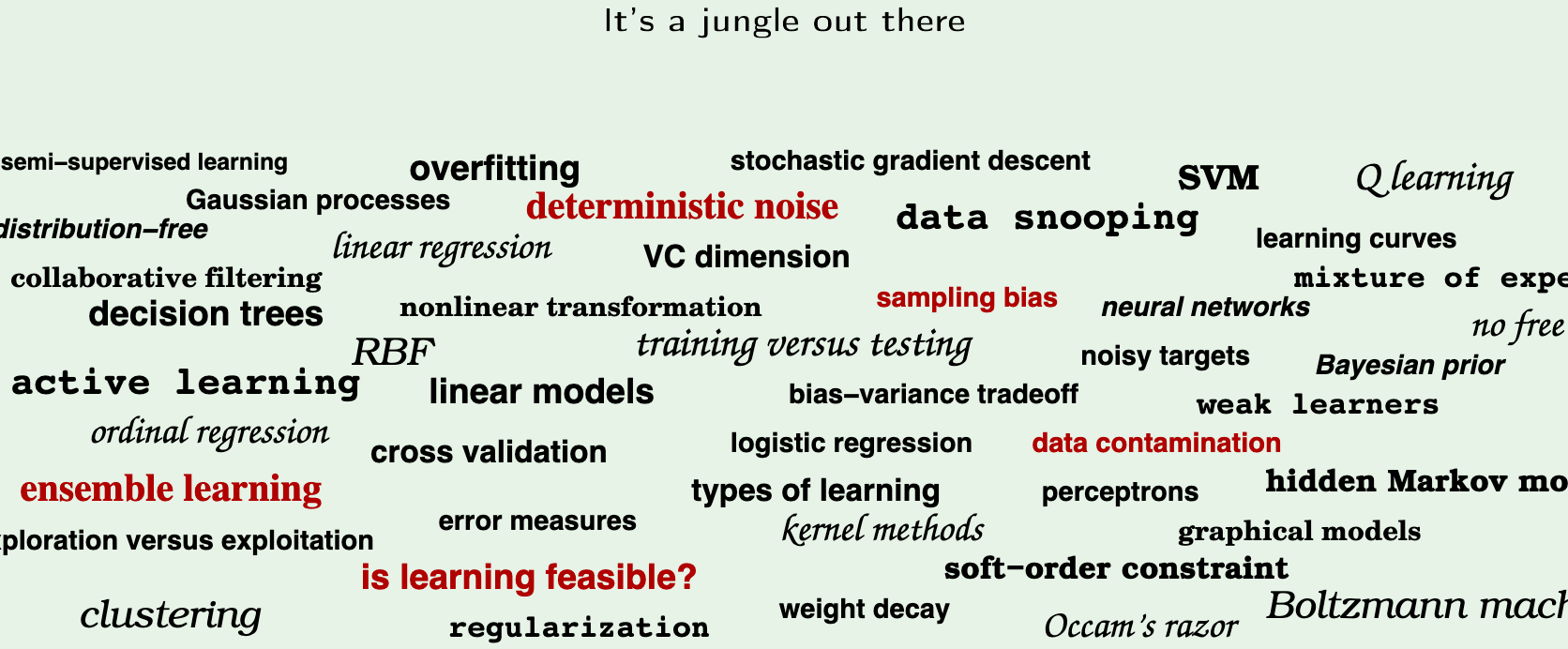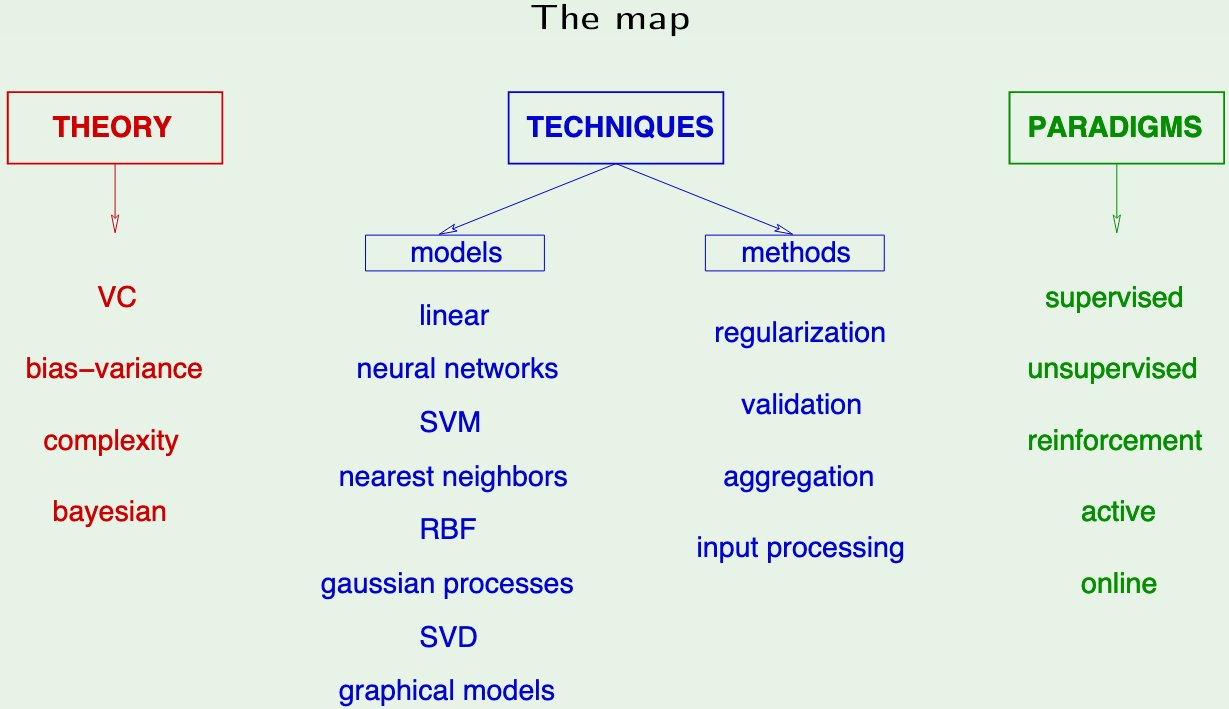About
Table of contents
- About
- Broad Topics:
- Course Evaluation
- Bonus Grades
- Grading Scale
- Late Policy
- How to Submit work
- Academic Integrity
- Students with Accomodations
- UMBC policy for COVID-19
About
This course in machine learning will provide an extensive grounding in mathematical models used to make predictions and classification. We will be covering a wide-variety of computational techniques involved in machine learning, broadly classified as, unsupervised learning, semi-supervised learning, supervised learning, and representation learning. Throughout the course, we will discussing real-world applications of machine learning and will be prototyping models on both real-world datasets and benchmark datasets. At the near end of the course, I will provide a preface into deep learning, in particular autoencoders, which are a class of models useful in developing and testing novel deep learning models for learning semantic representations.
We will move from this jungle

to a ML map

Picture Credit Dr. Mostafa @ Caltech
Broad Topics:
Introduction to Machine Learning, Learning Problem, Generative Modeling, Linear Regression and Probability Estimation, Optimization and Geometry, Support Vector Machine and Kernel Methods, Trees and Forest, Probabilistic Graphical Models, Learning Theory, Representation Learning (Some Excursion to Deep Learning) and Interpretable, Explainable Machine Learning.
Books Referred for the Course
- Foundations of Machine Learning
- Elements of Statistical Learning
- Pattern Recognition and Machine Learning
- Machine Learning Topics
- Machine learning Yearning
- A Course in Machine Learning
- Interpretable Machine Learning: An Optional Read
Course Evaluation
The course consists of four gradable components:
- Presentation Sessions (in groups) (30%) : The presentation sessions will be distributed into three parts: (a) Final Project Proposal Presentation, (b) Project Update Presentation 1, and (c) Final Project Presentation.
- Reading Assignments (every week) (5%) : The reading assignments will comprise of research papers in machine learning, with an intention to introduce to you advances in the machine learning application, new algorithms, and explainable machine learning.
- Coding Assignments (Bi Weekly) (10%) : there will be a coding assignment provided at the end of the class which each student has to complete and return in 10 days time. The coding assignments will be completely based on the ongoing topic or on a topic previously completed.
- Mid-term (15%) : After 4 weeks of the course, there will be a mid-term which will include theory, case-based scenarios, and pseudocodes.
- Quizzes (20%) : There will be two quizzes during the course. One will take place before the mid-term and one at the end of the course, before final project presentations.
- Final Project (in groups) (20%) : The Final Project will be assessed based on Final Project Report (15%) and Final Project Code (5%). It is important to submit a high quality version of the report for good grades. It is also important to run by with me the project report for its consistency, grammaticality, and flow of the write-up. By the end of the first two weeks of the class, I would require, a tentative project title and the name of the members of a team, for the final project. Amidst the class, I would schedule one-on-one session and class presentation to keep the project on track.
- Please fill out this google spreadsheet with details on the final project
Bonus Grades
The bonus grades will be awarded based on the final project’s competency to be submitted to a machine learning, data science, or natural language processing conference. To decide on the bonus grades, I would lay emphasis on:
- Motivation and Problem Formulation
- Literature Review
- Experiment and Dataset Design
- Results and Discussion
- Conclusion (What have been achieved, Limitations, and Future Work)
Please choose one of the following templates to submit the final project report:
I suggest every student in the class to use LaTeX to typeset their final project report. Deadline to turn in your Project Report is TO-BE-DECIDED.
Grading Scale
- A (90 and above)
- A- (85-90)
- B (75-85)
- B- (70-74)
- C (60-69)
- C- (55-59)
- F (54 and below)
Late Policy
- Each late day extends the deadline by 24 hours, giving the student a total of six late days to use when submitting homework.
- The late days may be used in any way without limitations (e.g., all 6 could be used on one homework).
- Your grade won’t be influenced if you use late days.
However, late work that is turned in after all permitted grace periods have expired will not be graded.
- Although attendance won’t be recorded, it is your responsibility to stay informed about every class.
- The instructor will make an effort to provide announcements, slides, and notes online, but there are no guarantees.
- Therefore, be sure to check in with someone who attended class if you are unable to.
How to Submit work
NOTE: I am working on better and easy way of submission.
For now, we will use slack channel for submission of Assignments and Presentation. For Final Project, I will provide separate instructions. Please use this SLACK-LINK for signup.
Academic Integrity
I take academic dishonesty seriously. Any sort of activity which relate the cheating, plagiarism, fabrication (e.g. use Adobe tools), or copy-paste will be not be tolerated. If caught for the first time would lead to a 50% reduction in the grade on the assignment. If the same activity is performed next, would result in an F grade in the course and a disciplinary action will be taken which may lead to suspension or dismissal.
Please do visit the academic dishonesty policy available in the Academic Integrity at UMBC.
Especially for computer science classes, there are generally questions about what is and is not allowed. However, you may not write or complete assignments for another student; allow another student to write or complete your assignments; pair program; copy someone else’s work; or allow your work to be copied. This list is not inclusive.
Students with Accomodations
The office of Student Disability Services (SDS) works to ensure that students can access and take advantage of UMBC’s educational environment, regardless of disability. From the SDS,
UMBC is committed to eliminating discriminatory obstacles that may disadvantage students based on disability. Services for students with disabilities are provided for all students qualified under the Americans with Disabilities Act (ADA) of 1990, the ADAAA of 2009, and Section 504 of the Rehabilitation Act who request and are eligible for accommodations. The Office of Student Disability Services (SDS) is the UMBC department designated to coordinate accommo- dations that would allow students to have equal access and inclusion in all courses, programs, and activities at the University. If you have a documented disability and need to request academic accommodations, please refer to the SDS website for registration information and to begin the process, or alternatively you may visit the SDS office in the Math/Psychology Building, Room 212. For questions or concerns, you may contact us through email or phone (410) 455-2459. If you require accommodations for this class, make an appointment to meet with me to discuss your SDS-approved accommodations.
UMBC policy for COVID-19
While facemasks are recommended in many areas of the campus, they are still mandatory for laboratory and classroom contexts. If students are having difficulties hearing and understanding a masked individual, instructors can submit an RT ticket with DOIT to discuss microphone and other AV options. We remind you to be respectful of one’s decision to mask or not outside of classroom contexts.